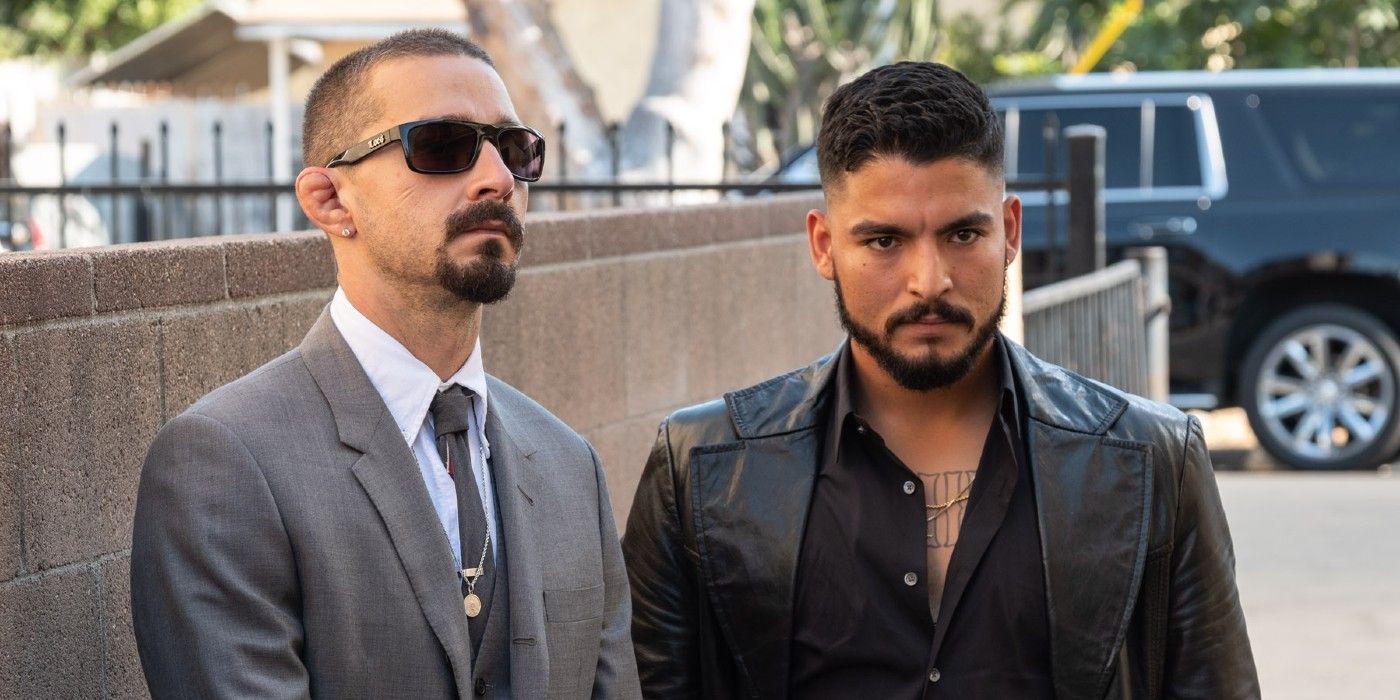Here's what the ending to The Tax Collector and its final scene mean. Going back to his early days as a screenwriter on The Fast and the Furious and Training Day, David Ayer has always had a thing for telling gritty crime stories based in Los Angeles. Once again drawing from his own experience growing up as a teenager in the area, the filmmaker is back with yet another grisly tale set in South Central L.A., this time in the form of an original crime-thriller titled The Tax Collector.
Bobby Soto and Shia LaBeouf star in The Tax Collector as David and Creeper, a pair of "tax collectors"/enforcers who work for an L.A. crime lord known as The Wizard (Jimmy Smits), collecting his 30% cut of the profits from no less than 43 local drug gangs. But when their boss' old enemy, a cruel and merciless gangster named Conejo (Jose Conejo Martin), returns to L.A. from Mexico and demands David and Creeper work for him instead, it threatens their entire operation, forcing an increasingly desperate David to do whatever it takes to protect his family from harm.
The big reveal comes during The Tax Collector's final scene, in which we learn The Wizard is actually David's father (something David has been aware of this whole time, no less). But in order to fully understand the significance of this twist, you have to back up a bit and look at how the movie set it up to begin with.
The Tax Collector's Wizard Identity Twist Explained
Up until The Tax Collector's final moments, David's backstory is something of an enigma. The movie doesn't explain how he came to work for The Wizard in the first place, but confirms he has larger family ties to L.A.'s criminal underworld thanks to his uncle Luis (George Lopez). Still, there's no real discussion about what became of David's father and mother, so it's unclear if they too have (or had) connections to the city's illicit activities or whether David got pulled into his life by other forces, like his uncle. At the same time, The Tax Collector shows David is a deeply spiritual family man and committed to his loved ones, be it his wife Alexa (Cinthya Carmona), his children, or his relatives, some of whom even work for him. So, in that regard, the lack of information about his parents is the film's way of quietly indicating their identities might be more important than you think.
There are other hints too, like how The Wizard never speaks to David and merely cackles at him when they're on the phone together. It really bothers David too (as he confesses to Alexa), to the degree that it makes more sense for the two to have a personal relationship that goes beyond simply a shadowy crime boss and his underling. The pair being father and son further explains why Conejo targets David and those closest to him as remorselessly as he does. It's not just about him seizing control of The Wizard's operations; it seems he wanted to turn his rival's own son against him, as a way of gaining personal revenge on top of that. When this doesn't work him, he goes for the next best thing: killing David and taking away everything he has, including - potentially - his children (e.g. The Wizard's grandchildren), if David refuses to do what he tells him to again.
How The Wizard Being David's Father Changes Tax Collector's Story
Knowing The Wizard is really David's father paints The Tax Collector's plot in a different light. Instead of being the story of a man who entered a life of crime for the money and power that comes with it, it becomes a narrative about someone who was born into this world and has chosen to embrace it, rather than walking away from it. In many ways, this paints David is a more sympathetic light, suggesting he might've been a genuinely decent person, had he been afforded better opportunities (many of which were no doubt denied to him because of his heritage and race). Even leading the life he does, David strives to be a good husband to Alexa, a kindly father to his children, and a true follower when it comes to his religious beliefs. He's equally fair towards his business associates (preferring to use intimidation tactics over brutal violence whenever possible), which earns him the respect of rival gangs and organizations in L.A.
Nevertheless, his dark deeds finally catch up to him when Conejo rolls into town, not even hesitating to send his men after David and Creeper (with their guns, very literally, blazing) immediately after they turn down his proposal to become his new employees. As a result, both Creeper and Alexa end up being personally killed by Conejo and his silent comrade, Gata (Cheyenne Rae Hernandez), and David's kids are kidnapped and held ransom, in exchange for the only other thing David has left to offer: the getaway money he and Creeper stole and have long kept stashed away (check that, buried), in case of an emergency. In this sense, it's Conejo who's the true "tax collector" in the film, making David pay the cost for not only all the terrible things he's done in the past, but also the sins of his father before him.
What The Tax Collector's Ending Really Means
After rescuing his children and killing Conejo (with the assistance of other gang members, who come to his aid), David calls up The Wizard during the final minutes of The Tax Collector, demanding he actually speak to him. By doing this, he's forced to truly wrestle with questions about his criminal legacy and the decisions that brought him here. In a more figurative sense, this is David demanding answers from the "god" and not-so-holy father (both metaphorical and literal) whom he's faithfully served all these years, despite having never truly received the guidance he wanted or needed from them. The Wizard responds by indicating he's been where David is before (re: having lost loved ones because of his work, perhaps even David's mother) and it shaped him into the man he is today, which begs the question: will his son continue to follow in his father's footsteps, now that he fully understands the price of the "taxes" that come with his position?
It's probably best The Tax Collector doesn't give a firm answer to this question so late in the game (though David, devastated by the loss of Alexa in particular, clearly wants out of this life). Ayer, as a storyteller, has never been inclined to offer his characters easy ways out of the cycles of violence they so often find themselves trapped in; even when they do walk away still breathing, they're left wrestling with questions about the death and destruction they've bore witness to, and the price they themselves have paid to make it this far. So, in that regard, both David and the audience are meant to be in the same boat by the time the movie's end credits start rolling, leaving them to wonder how they might deal with questions of legacy (hopefully, the non-criminal variety) in their own life.




